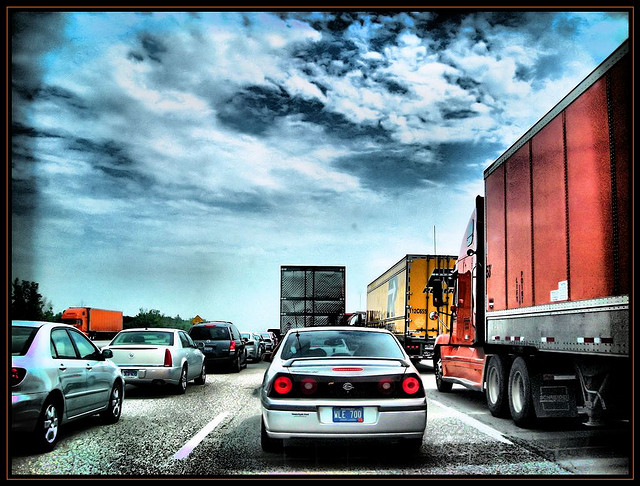Traffic-jam thoughts on the road to incivility
One mistaken belief in our culture concerns the supposed neutrality of technology. One takes a risk, in Michigan, in suggesting that the automobile has been, on the whole, a social negative, but that's precisely the argument I want to make.
I could point to the deleterious environmental impact of the automobile. I could point to the ways in which road systems have ruined landscapes, neighborhoods, and farms. I could point to the ways in which urban design has been perverted by the assumption that, as James Howard Kunstler has put it, every automobile ought to be made happy.
But instead I'm going to focus on how the automobile has deepened two of the distinctive pathologies of mass society: social estrangement and the corruption of morals.
My epiphany happened recently while driving I-196 between Holland and Grand Rapids. There has been a lot of construction on that road lately, which has required a narrowing of the expressway to one lane. This has caused significant congestion, and highlighted those who refuse common courtesy.
Social order is not held together by law, but by the customs, manners and mores of a citizenry – what Tocqueville referred to as the "habits of the heart." If you want to know how well-ordered a society is, look at how citizens behave beneath the veneer of law. A legal order defines public space narrowly, and when social life is conceived legalistically it devolves into a licentiousness which doesn't nurture our nobler selves.
Such narrowing is exacerbated when individuals operate under the cloak of anonymity, their truer selves coming out. Living by the letter of the law becomes a fig-leaf over self-interest. Where self-interest reigns, justice is in danger. A sense of fair play and deference to others yields to one's own perceived need to "get ahead."
Most persons wouldn't cut in line at a movie theater or at an office. It is understood that we should wait our turn, that fairness requires a kind of first-come, first-served policy, and that our claims are no weightier than that of anyone else. But mainly we fear the public opprobrium that would be showered upon us should we violate these social norms. We'd be hissed and booed and generally guilted into doing the right thing.
This is one way in which public life reinforces virtue. Doing the right thing because it is what you will is best of all. Second best is being guilted or shamed into doing the right thing. But a society of persons who can neither see nor choose the right, and neither can they be guilted, is lost indeed. Such intemperance is the enemy of a well-ordered liberty.
The saints and wise among us reflexively do what is right. Most of us require the props of public life to help us see what is right and then spur us to its performance. The Greeks referred to a person who doesn't engage the solicitous formation of public life as an idiotes (from which we get our word “idiot”). They regarded such persons as selfish and ignorant, as lacking in virtue. The more private we become, the more idiotic we become.
Few things make us more idiotic than being behind the wheel of an automobile. Here, shielded by glass and steel against the incriminating glares and catcalls of our fellow citizens, we pursue, at high speed, self-centeredness without a whit of concern for others. I am referring, of course, to persons who, when traffic narrows to one lane, insist on passing in the closing lane, thus bypassing the queue. Such persons seem to think their time is more valuable than anyone else's, that waiting in line like the rest of us poor schlepps is somehow beneath them. They violate one of the basic premisses of justice as fairness.
Justice, like all virtues, needs to be habituated, it needs to be practiced in the little things in life. Persons who can't be counted to behave justly except when the law requires are not persons you want for neighbors. A public sphere where individuals can misbehave with impunity is no public at all. So my advice to my fellow Michiganders is, next time you see construction ahead and are frustrated with the snail's pace, get in line.
See what new members are saying about why they donated to Bridge Michigan:
- “In order for this information to be accurate and unbiased it must be underwritten by its readers, not by special interests.” - Larry S.
- “Not many other media sources report on the topics Bridge does.” - Susan B.
- “Your journalism is outstanding and rare these days.” - Mark S.
If you want to ensure the future of nonpartisan, nonprofit Michigan journalism, please become a member today. You, too, will be asked why you donated and maybe we'll feature your quote next time!


 The next time you find yourself staring at slow-moving taillights, consider the level of rudeness automotive travel encourages. (Photo by Flickr user K2D2vaca; used under Creative Commons license)
The next time you find yourself staring at slow-moving taillights, consider the level of rudeness automotive travel encourages. (Photo by Flickr user K2D2vaca; used under Creative Commons license)